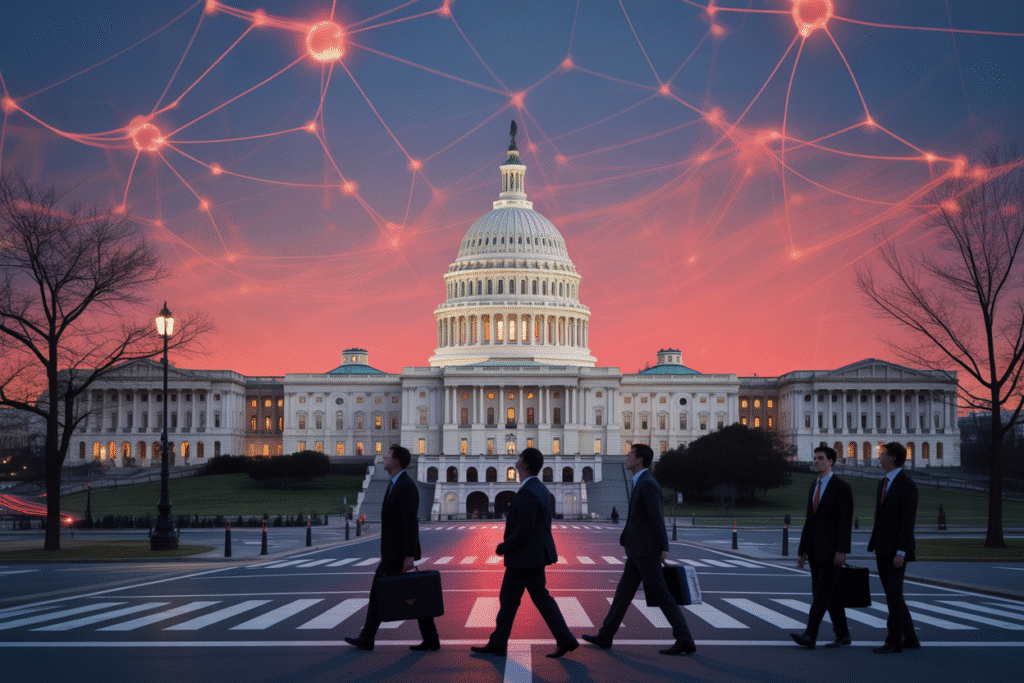In the last 3 h, AI politics erupted on X—Sacks vs. China, state revolts, and lobbying leaks.
Scroll X right now and you’ll find David Sacks, Trump’s new AI czar, pleading with lawmakers: regulate too hard and China wins by default. His video—posted barely three hours ago—has already ignited thousands of hot takes, retweets, and quote-tweets. Beneath that storm sits a deeper question shadowing every timeline: does the United States dare stay hands-off while algorithms reshape war, work, and truth?
Sacks Sounds the Sirens: Over-Regulation as National Suicide
David Sacks stares into the camera, sleeves rolled, voice edged with urgency. “We are in an arms race and every extra compliance form is a gift to Beijing.”
In his just-released clip he paints two futures: one where nimble U.S. startups ship breakthrough cancer-diagnosis AIs, another where thick binders of federal rules strangle them before release. Net result? A Chinese model trained on looser ethics dominates hospitals, finance, and defense.
Supporters cheer—finally someone willing to sprint rather than crawl. Critics clutch digital pitchforks. They ask pointed questions: what happens when a rushed facial-recognition rollout misidentifies protestors?
Bullet points keep the stakes clear:
• Pro: Faster FDA approval pathways for AI-discovered drugs
• Con: Less testing could amplify hidden racial bias in diagnostics
• Wild card: China openly funds state labs with zero IRB oversight
The replies under the post swing from “patriot” to “reckless.” One data-scientist mother writes, “My son’s leukemia trial got canceled—how fast is too fast?” A venture capitalist responds with rocket emojis.
Every share widens the fracture between two camps: speed versus safety.
State Revolt: Fifty Laboratories of Regulation
While the feds argue, states are done waiting. At 1:47 p.m. today Ars Technica posted a thread showing how California just enacted bias-audit rules for HR bots and New York mandated “explainable AI” when credit scores deny a loan.
Picture a startup founder staring at a map splattered red, yellow, and green—each color a different set of privacy statutes. A simple job-matching algorithm now needs three legal reviews before it can post a listing.
Yet local advocates say patchwork beats paralysis. When Texas forced Clearview AI to delete faceprints, hundreds of undocumented residents slept easier.
Short case vignettes keep the pulse visible:
• Utah fines companies up to $7,500 per undisclosed training-data breach
• Vermont exempts open-source models—academics cheer
• Illinois courts are clogged because biometric lawsuits now outnumber parking tickets
Investors grumble about due-diligence hell, but civil-rights groups retweet the map as a badge of courage. The comment wars rage under every article: “Laboratories of democracy!” versus “Commerce killer!”
Federal gridlock turned statehouses into the new frontline of AI politics.
Lobbyists in the Shadows: How Big Tech Writes the Rules
Minutes after Sacks stopped speaking, a second video dropped—this one from FAR.AI, a policy watchdog. Hidden-camera footage shows lobbyists laughing about “distracting senators with deepfake porn hearings” while real bills on model-weight export limits die in committee.
Mark Brakel narrates the montage: Anthropic policy staff sipping lattes, Microsoft strategists swapping slide decks titled “China Threat Narrative.” They pitch fragmented state laws as a feature—better fifty squabbling legislatures than one coherent federal rule.
Twitter sleuths freeze-frame a whiteboard that lists “Invoke Skynet fear—works every time.” Replies alternate between outrage and gallows humor.
Quick data snapshot:
• 47 meetings with House offices in the last 30 days cite “Chinese superiority”
• DeepMind alone spent $1.2 million on Q2 federal lobbying
• Only 3% of disclosed emails mention job displacement
The comment sections devolve into memes—lobbyists as Sith Lords clutching bags of cash. Meanwhile, a lone engineer replies with a thread on how internal red-team budgets got slashed to fund the very lobbying tours exposed.
Every leaked slide turns a policy abstraction into personal stakes: whose job disappears when the model launches untested.


